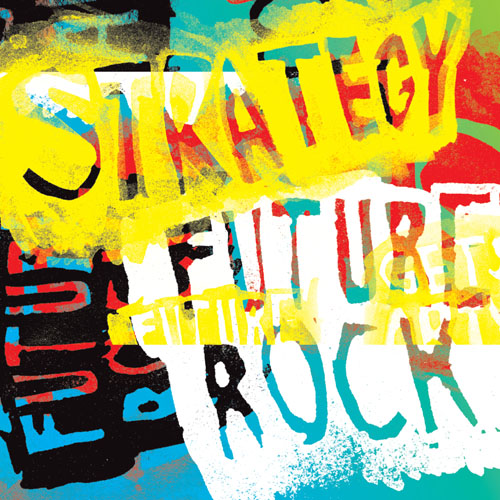Strategy, "Future Rock"
 Paul Dickow has more than impressed me since the release of Drumsolo's Delight in 2004. Since that time a series of outlandishly excellent 12" records have been released and Dickow has proven he can turn any song into gold if given the chance to remix it (check out his remix of "The Love That I Crave" by The Blow for proof). Future Rock rounds up everything great about those singles and situates them within the context of a solid full-length record chocked full of jazz, rock jams, and dub thick enough to make even the most resigned yuppie learn how to move his hips.
Paul Dickow has more than impressed me since the release of Drumsolo's Delight in 2004. Since that time a series of outlandishly excellent 12" records have been released and Dickow has proven he can turn any song into gold if given the chance to remix it (check out his remix of "The Love That I Crave" by The Blow for proof). Future Rock rounds up everything great about those singles and situates them within the context of a solid full-length record chocked full of jazz, rock jams, and dub thick enough to make even the most resigned yuppie learn how to move his hips.
Kranky
"I Have To Do This Thing" from the World House 12" sealed the deal: Dickow's brand of dub-turned-psychedelia became the undisputed champion of deep sound the second the synthetic bass melody began pumping its fuzzy electronic blood through the echo chambers of drums and funky keyboards that populated the rest of the track. I listened to that song an unhealthy number of times and in the process found myself dreaming about what a full-length record would sound like were it to be populated by such unrelenting groove. Future Rock begins where "I Have To Do This Thing" left off with a ring of ultra-processed sound oozing with all manner of mirco-sounds. Dickow has not simply rested on his past success, however: he incorporates a phased vocal performance touched by subtle guitar rhythms and squirming bass right from the start. "Can't Roll Back" foreshadows the entire album, exhibiting an increased complexity in Dickow's music that isn't as immediately evident on his previous 12" work and that only makes the music better. It spins, shuffles, moans, sings, and pounds away for nearly 60 minutes without a hitch or wasted note.
Dickow maintains a density throughout Future Rock by building songs up piece by piece and then mixing each of the elements together like a master alchemist. Amazingly, each part of every song is prominent and powerful enough to take center stage and serve as a focal point around which other parts might play. Dickow, however, always seems capable of adding more to his swirling mix, as he does on "Future Rock" and "Red Screen." Both songs swim with a virtual army of instruments and each expands and contracts naturally without sounding muddled or confused. As the songs progress and new elements are added, old ones float back into the limelight and emerge as new. The result is a mass of music that is brimming with one catchy and addictive part after another. "Phantom Powered" originally caught my attention with its crunchy bass line, but repeated listens found my attention focused squarely on the rumbling of reverb-rich samples that accentuate that bass line. The songs begin to feel organic at some point and all the varied rhythms and melodies merge into a coherent whole that is unthinkable without each of its constituent pieces.
In interviews Dickow has spoken about the technicalities involved in writing and recording Future Rock. In some cases knowing what went into a record makes it better and aids in understanding why everything sounds the way it does. Future Rock is the rare record that needs no explanation and sounds exquisite from the start. What the technical side may have added, however, is a depth uncommon to many beat-laden records. Every song on here gets better with time and as of this writing Future Rock has probably been played well over 15 times from start to finish with a number of spins reserved for a couple of favorite tracks. There's a lot of complexity on Future Rock, but its immediacy goes a long way in making it great.
samples:



